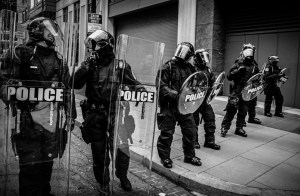
When choosing an earpiece for a specific application, a major consideration will be whether you require noise cancelling or situational awareness. Generally, you cannot have both without getting into high-end, specialized audio accessories.
So, how do you know whether to go with an earpiece that allows for situational awareness or one that blocks noise effectively? Keep reading for an overview of each type.
Situational Awareness Earpieces
These earpieces enable you to monitor your radio while maintaining awareness of your surroundings and the ability to identify potentially dangerous external sounds.
Situational awareness earpieces are ideal for:
- Construction workers who need remain aware of their surroundings on the site.
- Military personnel who need to stay alert in high-risk situations.
- Ambulance and EMS workers who need to be able to communicate via radio and face-to-face with those involved in an accident.
For example, picture a traffic police officer at a car accident scene. They have a lot to deal with: talking to victims and witnesses, calling for other services like fire or paramedics, and communicating with their own dispatch, all while making sure they don’t get hit by other cars still driving down the road. In this application, situational awareness is crucial to ensure the officer’s safety.
Our acoustic tube earpieces can be fitted with several different types of situational awareness tips (ME-1, CB-1) as well as other non-acoustic tube earpiece styles.
 Noise Blocking or Cancelling Earpieces
Noise Blocking or Cancelling Earpieces
Noise cancelling earpieces effectively block out all external sounds so that you can focus completely on the information coming through your earpiece. Cutting out all distractions allows you to give your undivided attention to the task at hand.
These earpieces are ideal for:
- Large event security personnel who don’t need to communicate with attendees.
- Riot police who don’t need to interact with the public.
- Loud environments where face-to-face interaction isn’t required.
Continuing with the police example, noise blocking becomes more desirable in situations like large crowds where riot police are required. There is no real need to talk to the public and all the external noise makes it hard to communicate with fellow officers and dispatch, so they may prefer noise blocking or cancelling audio accessories. Impact offers P1W, P2W earpieces as well as select speaker mics and headsets that block or reduce background noise.

